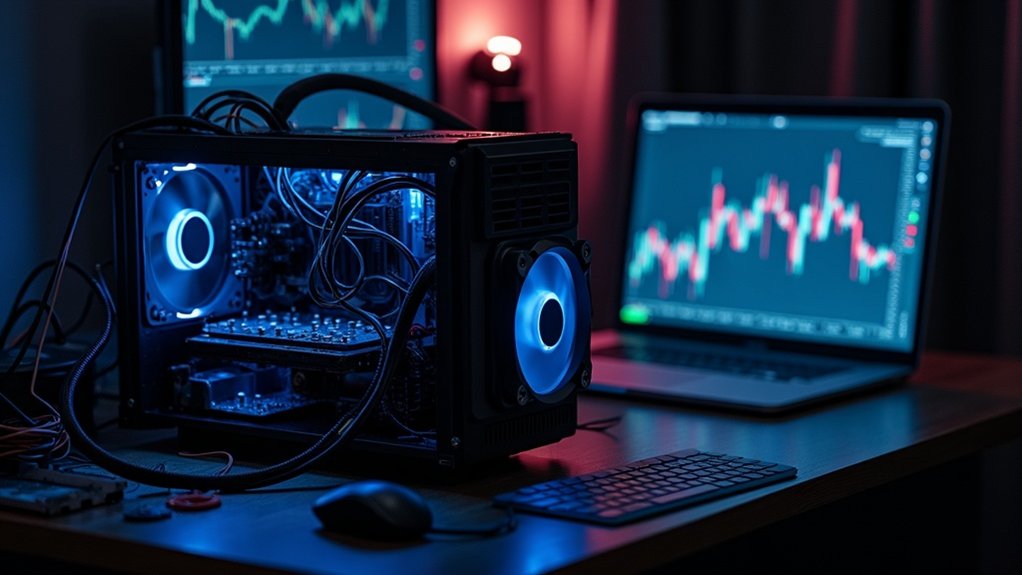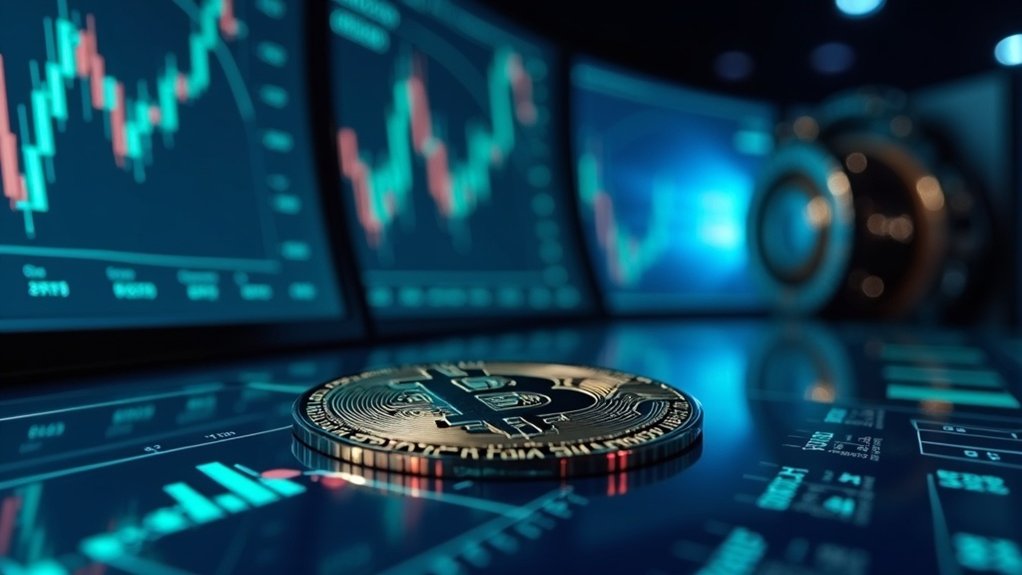Bitcoins can be purchased through cryptocurrency exchanges like Coinbase and Binance. Verification’s required – government ID, proof of address, the usual drill. Fees range from 1% to 4%, less with bank transfers. Alternatives exist: Bitcoin ATMs (expensive at 15%), P2P marketplaces, or services like PayPal. Mining? Not for the faint-hearted. It demands specialized ASIC hardware and serious electricity. Pool mining offers better chances than solo efforts. The crypto journey gets more interesting beyond these basics.
Bitcoin, the digital gold of our era, sits waiting for anyone brave enough to jump into its volatile world. Getting your hands on some isn’t complicated, just requires a bit of patience and paperwork. Most newcomers head straight to cryptocurrency exchanges like Coinbase, Binance, or Kraken.
Bitcoin waits silently, daring you to enter its wild ride—all it takes is some paperwork and a stomach for volatility.
These platforms demand your personal information—government ID, proof of address, sometimes even your social security number. Privacy? That’s cute. They’ll take between 1% to 4% of your money as fees, more if you’re using a credit card. But hey, at least their interfaces make buying straightforward. Most exchanges support bank account transfers for lower transaction fees.
Not feeling the exchange vibe? Options exist. Traditional stockbrokers now offer Bitcoin through ETFs, with fees around 1%. P2P marketplaces connect you directly with sellers, though you’ll need to trust strangers with your money. PayPal and Cash App sell Bitcoin too, but good luck trying to move it elsewhere.
And Bitcoin ATMs? They’ll happily charge you up to 15% for the convenience of using cash. Robbery without a mask.
Setting up requires being an adult—18 or older—with proper identification to satisfy those pesky KYC regulations. Verification can take minutes or days, depending on the platform’s mood and regulatory burden. You’ll need to link a payment method before transactions happen. Bitcoin has recently seen its all-time high of $124,290.93 on August 14, 2025, showing its massive growth potential.
Most places let you buy fractional amounts, so no need for tens of thousands of dollars. Only invest amounts affordable to lose when getting started with Bitcoin as its extreme volatility poses significant risks.
Mining Bitcoin is the alternative for the technically inclined and electricity-rich. It’s not about pickaxes anymore—specialized ASIC hardware dominates the scene, making CPU and GPU mining practically obsolete. The process consumes enormous electricity, with miners competing to solve cryptographic puzzles for the current 6.25 BTC block reward.
Solo mining? Nearly impossible now. Most miners join pools, combining resources to earn steady, smaller payouts based on contributed computing power.
The path to Bitcoin ownership isn’t simple, but it’s accessible. Just bring ID, money, and a tolerance for fees.
Frequently Asked Questions
What Are the Tax Implications of Owning Bitcoin?
Bitcoin owners face capital gains taxes when they sell, trade, or spend their crypto. Rates depend on how long they’ve held it—short-term (under a year) gets taxed like regular income (10-37%), while long-term holdings qualify for lower rates (0-20%).
Mining rewards? Taxed as income.
And starting 2025, the IRS wants wallet-by-wallet tracking. Transfers between wallets don’t reset cost basis.
Miss reporting this stuff and the IRS comes knocking. No fun.
How Secure Are Cryptocurrency Wallets Against Hacking?
Cryptocurrency wallet security varies dramatically.
Cold wallets? Pretty damn secure. Hot wallets? Not so much. Hackers love phishing attacks and malware to steal private keys.
Remember Coincheck’s $530 million hack? Yeah, exchanges aren’t immune either. Hardware wallets like Ledger and Trezor offer serious protection by keeping keys offline. Multi-factor authentication helps.
But honestly, even the most secure wallet can’t protect against human error—the weakest link in crypto security. Always has been.
Can Bitcoin Transactions Be Traced Back to Me?
Yes, Bitcoin transactions can absolutely be traced.
Every transaction lives forever on the blockchain—public and transparent.
No real names attached, but techniques like wallet clustering and graph analysis can connect those dots.
Law enforcement and analytics companies do this daily.
Using exchanges that require ID? Even easier to trace.
Those fancy “privacy tools” like mixers? They help, but aren’t foolproof.
Bitcoin’s not anonymous—it’s pseudonymous.
Big difference.
What Happens to My Bitcoin if I Lose My Password?
Losing a Bitcoin wallet password is brutal.
No password, no coins. Period. Unlike banks, there’s no “forgot password” button in crypto-land.
Without backup phrases or recovery methods, those bitcoins are fundamentally locked in a digital vault forever.
Some wallet types offer recovery options through seed phrases or specialized tools like btcrecover.
Others? Tough luck. Those coins join the estimated millions of Bitcoin permanently lost to password amnesia.
Digital gold, digitally buried.
How Does Bitcoin’s Price Volatility Affect Its Usefulness?
Bitcoin’s wild price swings create real problems.
Merchants can’t reliably price items—imagine selling something for $100 in Bitcoin only to have it worth $80 minutes later. Not exactly ideal.
Consumers hesitate to spend it (what if it doubles tomorrow?). The volatility attracts traders and speculators but scares away everyday users.
Simply put, Bitcoin becomes more of a gambling chip than a currency.
Stable money shouldn’t give you whiplash. Regulation might help eventually.









